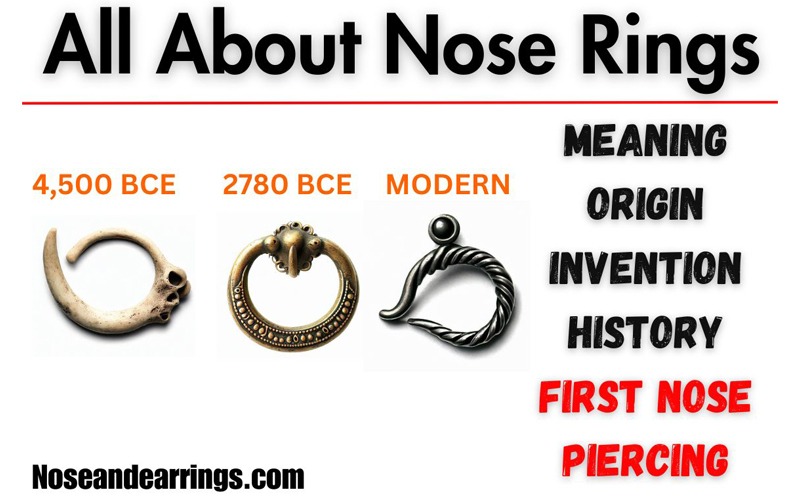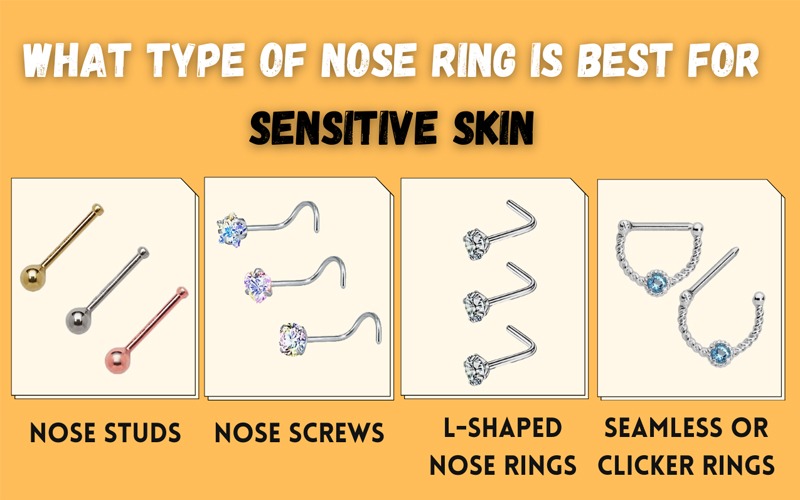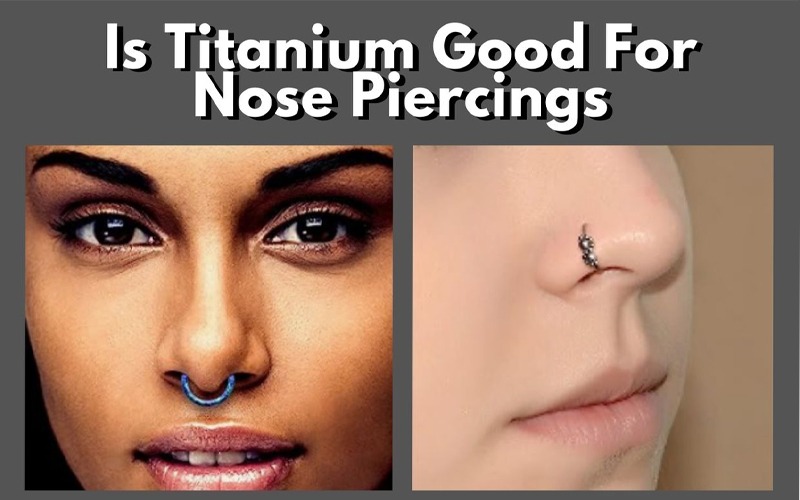An overview of the importance of proper nose ring hygiene
Maintaining proper nose ring hygiene is crucial to avoid any complications or unpleasant odors. Nose rings, like any body piercing, require regular care to ensure they stay clean and free from bacteria. This not only reduces the risk of infections but also helps prevent any bad smells that may arise from wearing a nose ring.
Possible reasons for a bad smell from a nose ring
There are several reasons why a nose ring may develop a bad odor. It is important to identify and address these issues to keep the nose ring smelling fresh and clean. Some possible causes of a bad smell from a nose ring include:
- Bacterial growth: When proper cleaning and aftercare routines are not followed, bacteria can accumulate around the nose ring. This can lead to an unpleasant smell. Regular cleaning with saline solution or gentle soap helps eliminate bacteria and prevent odor.
- Accumulation of dead skin cells: Dead skin cells can build up around the nose ring, especially if proper cleaning is not maintained. This can create a favorable environment for bacteria to thrive and consequently cause an odor. Gently exfoliating the area around the nose ring can help remove dead skin cells and prevent odor.
- Poor quality jewelry: Low-quality nose rings can be made of materials that react with skin oils and sweat, leading to an unpleasant smell. It is important to select high-quality nose rings made of materials like stainless steel or titanium, which are less likely to cause odor.
- Infections: An infected nose piercing can produce a foul odor. If you notice symptoms of infection such as increased pain, redness, or discharge, it is essential to seek medical attention promptly.
By addressing these potential causes and adopting a regular cleaning routine, you can maintain proper nose ring hygiene and avoid any unpleasant smells. Remember to consult with a professional piercer or dermatologist if you experience persistent or severe issues with your nose ring.

Poor Hygiene
Inadequate cleaning practices leading to a foul odor
Poor nose ring hygiene can result in a foul odor emanating from the piercing. It is essential to follow proper cleaning practices to prevent bacterial growth and the subsequent unpleasant smell. When aftercare routines are not diligently followed, bacteria can accumulate around the nose ring, leading to the development of an unpleasant odor. Regular cleaning with a saline solution or gentle soap can help eliminate bacteria and prevent the odor from occurring.
The role of bacteria in causing the smell
Bacterial growth is one of the primary causes of a bad smell from a nose ring. When the area around the piercing is not properly cleaned, bacteria can thrive and multiply. As these bacteria accumulate, they release waste products that contribute to the foul odor. By maintaining proper nose ring hygiene and regularly cleaning the area, you can effectively reduce bacterial growth and prevent the smell from occurring.
It is crucial to note that a bad smell from a nose ring can also be caused by other factors such as the accumulation of dead skin cells or poor quality jewelry. Dead skin cells that build up around the nose ring can create an ideal environment for bacteria to thrive and cause an odor. Gently exfoliating the area around the piercing can help remove dead skin cells and prevent odor. Additionally, low-quality nose rings made of materials that react with skin oils and sweat can contribute to an unpleasant smell. Choosing high-quality nose rings made of materials like stainless steel or titanium can help minimize odor.
If you experience symptoms of infection such as increased pain, redness, or discharge, it is crucial to seek medical attention promptly. Persistent or severe issues with your nose ring should also be addressed by consulting with a professional piercer or dermatologist. By addressing potential causes and maintaining proper hygiene practices, you can keep your nose ring clean, fresh, and free from unpleasant smells.
Accumulation of Dirt and Dead Skin Cells
Dirt and dead skin cells as a potential cause of the bad smell
The accumulation of dirt and dead skin cells can also contribute to a bad smell emanating from a nose ring piercing. When the area around the piercing is not properly cleaned, debris such as dirt and dead skin cells can accumulate. These substances create an environment for bacteria to thrive, leading to the development of an unpleasant odor.
Importance of regular cleaning and exfoliation
To prevent the accumulation of dirt and dead skin cells and minimize the risk of developing a bad smell, it is essential to follow a regular cleaning routine. By gently cleansing the area with a saline solution or mild soap, you can remove dirt and dead skin cells, reducing the potential for bacterial growth and odor. Additionally, exfoliating the area around the piercing can help remove any built-up dead skin cells, further promoting cleanliness.
It is important to note that cleaning the nose ring too vigorously or using harsh products can irritate the piercing and disrupt the healing process. It is recommended to follow the aftercare instructions provided by a professional piercer or dermatologist to ensure proper cleaning techniques are followed without causing any harm.
So, the presence of dirt and dead skin cells around a nose ring piercing can contribute to a foul odor. Regular cleaning with a saline solution or mild soap and gentle exfoliation can help prevent the accumulation of these substances and reduce the risk of developing a bad smell. By maintaining proper hygiene practices and promptly seeking medical attention for any signs of infection, individuals can keep their nose ring clean, fresh, and free from unpleasant smells.

Metal Allergies
Allergic reactions to certain metals causing an unpleasant odor
In some cases, a bad smell coming from a nose ring piercing can be attributed to allergic reactions to certain metals. Some individuals may have a sensitivity or allergy to specific metals found in nose rings, such as nickel or copper. When these metals come into contact with the skin, they can cause an allergic reaction, leading to redness, inflammation, and an unpleasant odor.
Identifying and addressing metal allergies
If you suspect that a metal allergy may be the cause of the odor from your nose ring, it is important to identify the specific metal that is causing the allergic reaction. This can be done through patch testing or by consulting with a professional piercer or dermatologist. Once the allergen has been identified, the most effective approach is to avoid using nose rings made from that particular metal.
If you are unsure about the metal composition of your nose ring, you can opt for hypoallergenic materials such as titanium or surgical steel. These metals are less likely to cause allergic reactions and are often recommended for individuals with sensitive skin or metal allergies. By using nose rings made from hypoallergenic materials, you can minimize the risk of developing an unpleasant odor and other allergic reactions.
In summary, metal allergies can contribute to a bad smell coming from a nose ring piercing. By identifying and avoiding metals that cause allergic reactions and opting for hypoallergenic materials, individuals can reduce the risk of developing an unpleasant odor. Consulting with a professional piercer or dermatologist can provide guidance on the appropriate materials to use for your nose ring, ensuring a clean and odor-free piercing.
Infection
Infection as a possible cause of odor from a nose ring
In some cases, a bad smell coming from a nose ring piercing can be attributed to an infection. When a nose ring is not properly cleaned or cared for, bacteria can accumulate around the piercing, leading to an infection. This infection can cause a foul odor, along with other symptoms such as redness, swelling, pain, and discharge.
Signs and symptoms to watch out for
If you suspect that an infection may be the cause of the odor from your nose ring, it is important to look out for certain signs and symptoms. These may include:
- Redness and inflammation around the piercing
- Swelling and tenderness
- Pain or discomfort
- Pus or discharge coming from the piercing
- A foul or unpleasant odor
If you experience these symptoms, it is crucial to seek professional medical advice. A healthcare provider or professional piercer can properly assess your situation and provide appropriate treatment options. This may include cleaning the piercing with saline solution, applying antibacterial ointment, or in severe cases, prescribing oral antibiotics.
Preventing infection is key to avoiding the development of an unpleasant odor. Proper aftercare is essential, which includes cleaning the piercing with a saline solution or a mild, fragrance-free soap. It is important to avoid touching or twisting the piercing, as this can introduce bacteria. Additionally, avoid submerging the nose piercing in bodies of water, such as swimming pools or hot tubs, as these can also increase the risk of infection.
So, infection can be a possible cause of a bad smell coming from a nose ring piercing. Being aware of the signs and symptoms of an infection and seeking prompt medical attention can help prevent complications and further odor. Proper aftercare is crucial in maintaining a clean and odor-free piercing.

Drying Out
Lack of moisture leading to an unpleasant smell
In certain cases, the presence of a bad odor emanating from a nose ring piercing can be attributed to dehydration or lack of moisture. When the piercing is not adequately hydrated, it can cause the tissue to dry out, leading to discomfort and an unpleasant smell. Dryness can be exacerbated by environmental factors, such as low humidity or excessive exposure to air conditioning or heating.
Preventing dryness and keeping the nose ring moisturized
To prevent dryness and maintain a pleasant scent in your nose ring piercing, it is crucial to keep the area moisturized. Here are some tips to help you prevent dryness and maintain optimal hygiene:
- Apply a thin layer of fragrance-free, non-comedogenic moisturizer or oil around the piercing area to keep the skin hydrated. Be sure to choose a product that is suitable for your skin type.
- Avoid using products with strong fragrances or potential irritants, as they may exacerbate dryness or cause irritation.
- Drink an adequate amount of water to maintain overall hydration, which can help prevent dryness not only in your nose, but also in other parts of your body.
- Avoid excessive exposure to dry environments or extreme temperatures, as this can further contribute to drying out the piercing area.
- Consider using a humidifier in your home or office to increase the moisture content in the air, especially during periods of low humidity.
By following these hygiene practices and maintaining proper moisture levels, you can help prevent dryness and foul odors associated with nose ring piercings. It is important to remember that each person’s body may respond differently, so consider consulting a healthcare professional or a professional piercer for personalized advice and recommendations.

Healing Process
Odor during the healing phase of a new nose piercing
During the healing process of a new nose piercing, it is common to experience some odor. This can be attributed to the natural discharge and buildup of lymph fluid and dead skin cells that occurs as the body heals the piercing. The presence of bacteria in this discharge can contribute to an unpleasant smell.
Tips for managing the healing process and minimizing smell
To minimize the smell and promote proper healing of your new nose piercing, here are some tips to follow:
- Cleanse the piercing twice a day using a saline solution or a piercing aftercare solution recommended by your piercer. This helps to remove any buildup of discharge and bacteria.
- Avoid touching your piercing with dirty hands or unnecessary contact. This can introduce additional bacteria and prolong the healing process.
- Avoid using harsh cleansers or alcohol-based products on your piercing, as they can dry out the skin and delay healing.
- Avoid submerging your piercing in bodies of water, such as swimming pools or hot tubs, until it is fully healed, as these environments can increase the risk of infection.
- Avoid changing or removing your piercing jewelry until it is fully healed, as this can disrupt the healing process and increase the risk of infection.
- Make sure to follow any specific aftercare instructions provided by your piercer, as they will have valuable knowledge and experience in ensuring proper healing of your new nose piercing.
By following these tips and maintaining proper cleanliness and care, you can help minimize odor and promote a smooth healing process for your new nose piercing. If you have any concerns or notice signs of infection, it is important to consult a healthcare professional or your piercer for advice and guidance.
Incorrect Jewelry Material
Choosing the wrong material for a nose ring and its impact on smell
Using the incorrect material for a nose ring can have a significant impact on the smell during the healing process. Certain metals, such as nickel or brass, can cause irritation and allergic reactions in some individuals, leading to an increase in discharge and odor. The body’s reaction to the metal can result in an acidic odor, making the healing process more uncomfortable and unpleasant.
Recommended materials for nose rings
Choosing the right material for your nose ring can help minimize smell and promote a healthy healing process. Here are some recommended materials to consider:
| Material | Description |
|---|---|
| Titanium | Considered one of the best options for nose rings due to its hypoallergenic properties. It is lightweight, corrosion-resistant, and less likely to cause adverse reactions. |
| Surgical Stainless Steel | Another popular choice that is safe for most people with sensitive skin. It is durable, affordable, and resistant to corrosion. |
| Niobium | Similar to titanium, niobium is hypoallergenic and recommended for those with metal allergies. It is also lightweight and resistant to corrosion. |
When selecting a nose ring, it is essential to choose one made from high-quality, non-reactive materials. These materials reduce the risk of irritation, inflammation, and unpleasant odors. Additionally, it is advisable to consult with a professional piercer who can provide recommendations based on their expertise and your specific needs.
Conclusion
Summary of key points
The choice of material for a nose ring can have a significant impact on smell during the healing process. Incorrect materials like nickel or brass can cause irritation and allergic reactions, leading to unpleasant odors. It is important to choose high-quality, non-reactive materials like titanium, surgical stainless steel, or niobium to minimize smell and promote a healthy healing process.
Tips for maintaining a fresh-smelling nose ring
To maintain a fresh-smelling nose ring, consider the following tips:
- Clean your nose ring regularly with a saline solution or piercing aftercare solution recommended by a professional piercer.
- Avoid touching or twisting the nose ring excessively, as this can introduce bacteria and increase the likelihood of unpleasant odors.
- Avoid using alcohol-based products or harsh chemicals on your nose ring, as they can irritate the skin and cause odor.
- Be mindful of any signs of infection, such as excessive redness, swelling, or discharge, and seek medical attention if necessary.
- Avoid changing your nose ring too soon, as it can disrupt the healing process and increase the risk of infection and odor.
Following these tips, maintaining good hygiene, and using the correct material for your nose ring can help ensure a pleasant and fresh-smelling healing process.





